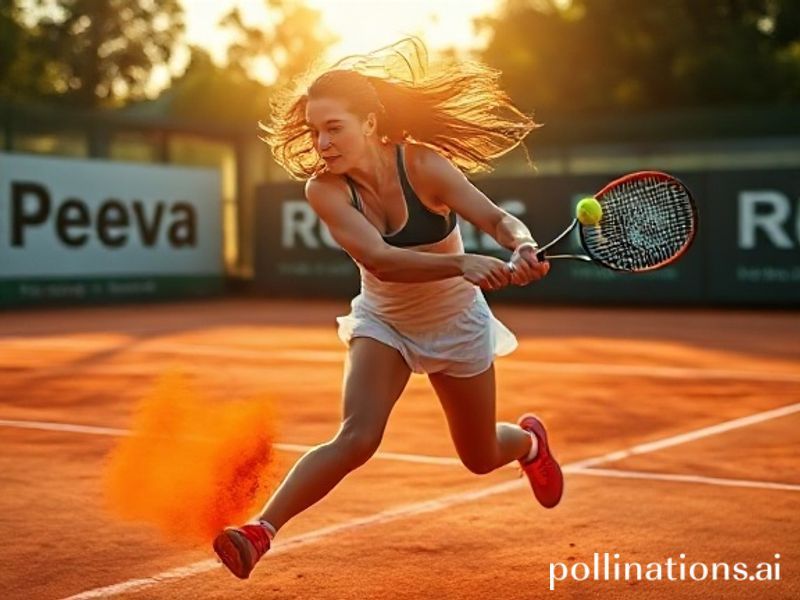Panna Udvardy: The Hungarian Tennis Player Accidentally Steering 21st-Century Geopolitics
The Accidental Geopolitics of Panna Udvardy
Or How a 24-Year-Old Hungarian with a Two-Handed Backhand Became a Soft-Power Weapon in a World That’s Already on Fire
By the time Panna Udvardy hoisted the Bogotá Open trophy last April, most of the northern hemisphere was busy doom-scrolling through grainy satellite pictures of a stalled 40-mile Russian convoy. Down in Colombia, however, the 24-year-old from Pécs was quietly staging her own little Iron-Curtain-reversal: a Hungarian athlete winning on South-American clay while Europe agonised over gas prices. It was, in its own understated way, the perfect metaphor for 2023—global attention fractured, yet somehow a tennis ball still managed to land inside the lines.
Udvardy herself would probably prefer we talk about forehand mechanics or her fondness for lángos, but history rarely consults its pawns. What’s interesting—what’s internationally interesting—is that her career arc now intersects with so many planetary fault lines you’d think she’d been scripted by a Netflix writers’ room on amphetamines.
First, take the nationality angle. Hungary currently ranks somewhere between “illiberal democracy” and “vaguely threatening folk-dance troupe” in the Western press. Prime Minister Orbán’s government has spent the last decade pioneering what political scientists delicately call “competitive authoritarianism.” Yet here comes Udvardy, sponsored by a state lottery whose billboards trumpet national pride, collecting WTA points in locales that can’t find Hungary on a map. Every time she signs an autograph in Guadalajara or Parma, she’s an unwitting ad for a country whose biggest cultural exports lately have been anti-LGBTQ statutes and goulash-flavoured propaganda. The irony is rich enough to clot arteries.
Second, there’s the supply-chain subplot. Tennis, like everything else, runs on Chinese factories: polyester strings, carbon-fibre frames, sweat-wicking fabrics spun in Shenzhen sweatshops. Udvardy’s Yonex racquet is basically a geopolitical nesting doll—Hungarian grip, Japanese branding, Chinese carbon. When she cracked the world’s top 80 last autumn, it was due in part to a 6.1-ounce graphite wand whose raw materials probably passed through the South China Sea, that happy maritime colosseum where U.S. destroyers now play chicken with PLAN frigates. Somewhere in the data cloud, an algorithm tallies ESG scores and decides whether her endorsements count as “sustainable.” Spoiler: they don’t.
Third, consider the broader soft-power scoreboard. In the same week that Udvardy reached the final in Hamburg, the U.S. announced another $400-million military aid package for Ukraine. The Western commentariat duly praised American largesse, while largely ignoring the fact that Hungary—Udvardy’s homeland—has quietly become the Kremlin’s most obliging EU neighbour, blocking sanctions and hosting Russian spies with the enthusiasm of a bribed maître d’. So every Instagram story Panna posts from a sun-drenched tournament café is, inadvertently, a pixel in Orbán’s domestic narrative: Look, the world still loves us; we even produce winning athletes who smile for selfies.
Which brings us to the fans. International tennis crowds are essentially passport agnostic; they’ll cheer a backhand winner even if it’s struck by the geopolitical equivalent of Darth Vader. Thus in Bogotá, Colombian teenagers chanted “U-dvar-dy!” without the faintest idea where Pécs is located. Meanwhile, Hungarian state television replayed the footage on loop, subtitled and patriotic, proof that sporting merit can launder any reputation—at least until the next news cycle.
And what of Udvardy herself? By all accounts she’s affable, hard-working, allergic to controversy. Ask her about foreign policy and she’ll smile, pivot, and discuss second-serve placement. Which is precisely the point: athletes are the last permissible blank canvases in a hyper-politicised world. We project our narratives onto them, then act surprised when the paint drips.
So when Panna steps onto the clay courts of Rome next month, remember that her match statistics will be parsed not just by coaches but by defence attachés, marketing executives, and TikTok propagandists. Every ace is a data point in some obscure influence index; every double fault, a fleeting dip in national pride. The universe, as Carl Sagan almost said, is under no obligation to make sense—but it does seem perversely fond of tennis metaphors.
In the end, Panna Udvardy’s greatest talent may be her ability to remain human while the rest of us insist on turning her into a symbol. That, and a deceptively nasty drop shot. If civilisation collapses tomorrow, cockroaches will scuttle past the ruins clutching tiny racquets, still arguing about rankings. Until then, we watch, we wager, we pretend the game matters—which, in its beautifully absurd way, it still does.







